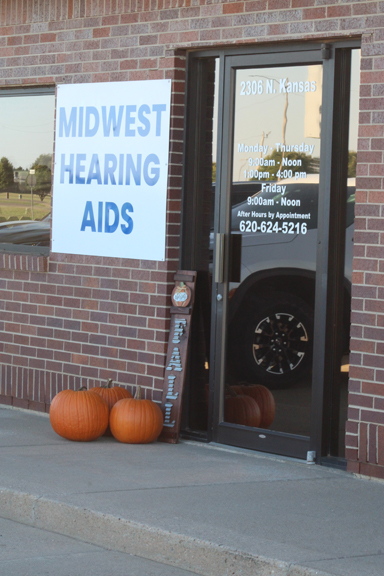ELLY GRIMM
• Leader & Times
The Liberal Hearing Aid Center has been a fixture in the community for many years and recently, the company underwent a slight change by being renamed Midwest Hearing Aids Inc.
Employee Debbie Sumner said the process of undergoing the change has been happening for a little while.
“Midwest Hearing Aids was started in 1948, and we've been the Liberal Hearing Aid Center since the end of the 1960s. In 2004 was when Midwest Hearing Aids bought us out, so we've been part of that group for several years,” Sumner said. “We'd always kept the Liberal Hearing Aid Center name and since the beginning of this year, when Zack [Miller] took over, we've been transitioning to officially becoming Midwest Hearing Aids. We were always a division of the company, and now we're officially changing the name. I've personally been here for almost 37 years.”
“I've been with the company for 17 years, and I also run the three offices in the Southeast Kansas since I live in Paola,” Zack Miller, the company’s new owner, added. “I've rather grown up in this business, so when the opportunity came for me to purchase the company in 2023 or early 2024, I seriously looked into it. The previous owner really worked with me on the details, and it ultimately ended up being something I couldn't pass up. Liberal has always been one of our highest-producing locations, so we're very proud of what's happened out here.”
Miller and Sumner also talked about the importance of children’s hearing tests.
“It depends on the child because now in Kansas, there's a newborn hearing screening program, so those issues get picked up at a pretty early age, and it's a very good program,” Miller said. “The first 18 months of life are when language development happens, so it's very important to make sure all of that is being monitored. If a newborn fails the hospital screening, they'll be scheduled for follow-ups with specialists. With growing children, if you notice they're having some trouble at school or issues with their speech, that could be a sign to get an exam done.”
“However, we don't actually see very many children patients here – we've had a few come in after being referred by the school system, but most of our patients are adults,” Sumner said. “We also get a lot of doctor referrals and do quite a bit of industrial testing.”
Overall, Sumner and Miller agreed, there is a lot to be excited about with the future.
“We're just looking forward to continue seeing patients and helping them with any issues they might have with the testing and everything else,” Sumner said. “We've also been doing some extra advertising, especially on the La Mexicana radio station, so the Hispanic population knows we're here to help them if they need it. The hearing aids we use are manufactured by Starkey, which is one of the largest hearing aid manufacturers, and they're all made in the U.S., which we're very proud of. They're also among the best in the world, so the quality is something people don't need to worry about.”
“We want to be there for everyone who needs us, and we get together a few times a year to brainstorm some potential ideas and hear from other providers. And that can be quite the task because – and we actually added this up – our providers have more than 400 years' worth of experience in the field, so there is a lot of talent there,” Miller added. “And with the technology being used with the hearing aids, the company is able to move forward more quickly than other manufacturers since they're not publicly traded. They're definitely a leader in the industry, and our patients can't say enough about the quality of their products. And it's not just hearing-disabled people who need hearing aids, they can also help people with normal hearing or mild hearing loss when it comes to certain tasks or situations.”
While the name is different, Sumner and Miller said clients can expect the same quality of service as before.
“The only major change is with the name and getting a new sign for the building. But all the personnel are the same and everything else since we've been a division of Midwest Hearing Aids for so long, so it's been really smooth,” Sumner said.
“It's all the same faces and same products and services, it's really only the name that's changing. My own parents have been with the company for more than 30 years, so that's how I came to be in all of this as well,” Miller added. “I'm a doctor of audiology and got my bachelor's degree and master's degree from Wichita State University, and there was definitely a lot of time and work that went into that. Another one of our doctors of audiology sees a lot of veteran patients and comes every four to six weeks to work with them and handle those appointments. A lot of people put issues with their hearing on the back burner in terms of it needing to be dealt with and/or treated. There are a lot of studies, especially from the past couple years, that have shown how untreated hearing loss can result in early onset dementia and Alzheimer's disease – people will isolate themselves because they can't hear, and then they gradually lose some of their cognitive abilities, and then it all snowballs from there. It's important, if you're in at least your 50s or 60s, to get your hearing tested on a regular basis so you have a baseline. We have multiple styles of hearing aids depending on the patient's needs.”








